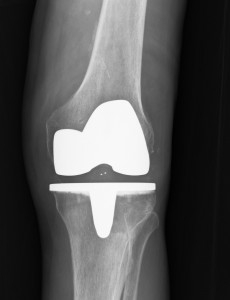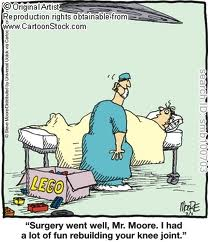This will be a follow up piece on my segment from October 2015 "Total Knee Arthroplasty--Why So Spooky?" If you have not looked at it I recommend taking a peek to get some general background on knee arthritis and surgery selection.
Ok so you have decided to take the plunge and sign up for a total knee arthroplasty (TKA). What happens next? First, I recommend making a list of questions about the procedure and follow up care and scheduling an appointment with your surgeon. During this appointment you can become more comfortable with the surgery schedule as well as short and long term expectations.
Day of surgery questions to consider: Where will the operation take place? We perform TKA surgery in both an outpatient setting at the surgery center, and inpatient at the hospital. A person's health, age, insurance, type of surgery, and preference all go into making the decision of outpatient vs inpatient surgery. Is there an information class? Many hospitals and total joint centers offer classes preoperatively to educate patients on how to prepare for surgery and what to expect the day of surgery. (For more information on Missouri Baptist's class click Here.) Do I need surgical clearance? Most total knee patients will need some form of clearance from at least their primary care physician. Often depending on health conditions patients may need to visit cardiologists, pulmonologists, other doctors, and even have tests run before being cleared for surgery.

Example of Post Operative Total Knee Arthroplasty Components
Short term expectations to consider: How long will you stay in the hospital/surgery center? This depends on your choice of having one knee replaced or having both done at the same time. Also your health will depend on how long you stay in the hospital. Often stays average 1-3 days. Will you have home health? Many of our patients have the assistance of home health and home physical therapy for a few weeks. This will vary depending on surgeon preference and patient ability. Will you be on a blood thinner? Studies show that there is an increased risk of blood clots the first few weeks after a replacement type surgery. Your surgeon will likely place you on a type of medication to thin your blood and prevent clots for 2-4 weeks. Also he/she may include leg stockings or leg pumping devices to increase blood flow for a period of time. Where will you go to physical therapy? This is important. You want to make sure that the therapist you work with has experience with joint replacements.

Long term expectations to consider: Should my therapist be doing that? I hear a lot about how mean physical therapists are! When it comes to total knee replacements 99% of the time they are doing exactly what they should. Therapists are really trying to get range of motion back in the joint. When I visit our patients in the hospital I always tell them that they have a 6 week window where range of motion is really essential. Their knee is trying to scar around their new components and the more we can move the knee the more mobile the scar will become. We all scar--that is inevitable, the more mobile the better. The more motion the better. This is why the PT is so hard on people the first 6-12 weeks after a knee replacement. Often patients thank them later. When will I get better? In medicine we try to give estimates and averages based on our experience with past patients. So on this question it is difficult with TKAs. I will tell you that at 12 weeks post op most people have their motion back and are doing their day to day activities well but still need strength. Patients will continue to see benefits and improvements from a TKA for the whole first year.
Before any surgery I encourage you to ask questions until you are comfortable with the procedure. As providers we want our patients to be our partners in healthcare and understand why tests, exams, and procedures occur. TKAs are a big undertaking but can have great success and provide much needed pain relief to those suffering from arthritis. Feel free to ask questions!
The information on this blog is intended for informational and educational purposes only. It is not intended to be used in place of medical advice. If you have orthopedic issues that need to be addressed please contact your physician.


